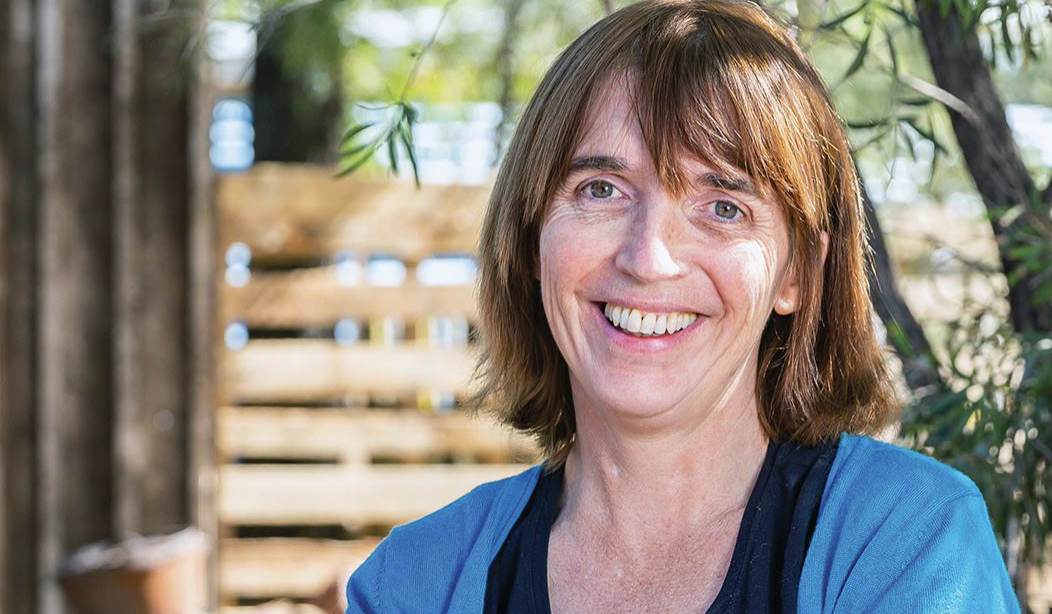
Sarah Brown AM is a crucial figure in the development of improved services in remote communities.
With a focus on advancing the health of Aboriginal Australians for nearly two decades, Sarah Brown AM (GradDipHlthAdmin ’15) is CEO of the Western Desert Nganampa Walytja Palyantjaku Tjutaku Aboriginal Corporation, known as Purple House.
Purple House was established after Pintupi people and community art centres raised $1 million through an art auction in 2000. The aim was to install dialysis units in Aboriginal communities so community members could stay on country, avoiding the need to travel hundreds of kilometres for treatment, and the cultural problems that accompany displacement from home.
‘I’ve been inspired by Pintupi community leaders who have stayed strong and determined to look after their families on country,’ says Sarah, who believes in supporting Indigenous leadership.
Driven by Sarah’s zeal and focus, Purple House now has more than 150 staff. They operate 18 remote clinics in the NT, WA, and SA, a self-contained mobile dialysis unit called the Purple Truck, nine social support services, and an aged care service.
SERVICES TAILORED TO NEED
She says her primary role is to help activate each community’s wishes, to meet their particular needs.
‘Aboriginal communities are coming up with their own solutions of how to overcome health care problems,’ says Sarah. ‘It’s not a generic solution – each program is run according to the wishes and input of each community, to best suit its people.’
An incredible result of this tailored approach is that Purple House patients now have a longer life expectancy than non- Aboriginal people on dialysis.
EXPANDING THE OUTREACH
The reach of the successful Purple House model is now extending further, to improve health outcomes for even more remote communities throughout Australia.
Through a crowdfunding campaign that raised $100,000, and with additional government funding, Sarah recently purchased a block of land in Coober Pedy to build a new Purple House dialysis centre for use by the local community.
The program’s influence continues to grow with the recent introduction of a federal Medicare claim number based on the Purple House model of dialysis care. This will provide continued funds to ensure the program’s long-term sustainability.
The centre has also been invited to manage remote community aged care, is teaching patients how to cook healthy food, and in Alice Springs is manufacturing bush medicine for sale to remote communities.
Excitingly, Purple House patients have been involved in developing the innovative Wangka Kutju language translation app for mobile phones, converting speech and words from English to Pintupi and vice versa.
The expansion of Purple House services and programs has been demanding on the hard working team, but is having positive results.
‘It’s all a bit hectic,’ Sarah admits, ‘but it’s having a profound impact. It’s empowering Aboriginal people, giving them some agency and giving them more control over how they lead their life. It’s busting some stereotypes of how people think about Aboriginal Australia.’
OUTSTANDING CONTRIBUTION RECOGNISED
Sarah’s inspiring work has won national recognition. The Australian Financial Review named her on its 2018 list of BOSS True Leaders, and she was made a Member of the Order of Australia in 2020 for her significant service to community health, remote area nursing, and to the Indigenous community.
Sarah’s outstanding contribution to community health, remote area nursing and the advancement of independent Aboriginal community-controlled health initiatives was also recognised with a 2020 Convocation Medal from Flinders University – the highest accolade of our annual Alumni Awards.
STUDYING TO LEARN AND APPLY BEST PRACTICE
Sarah says studying at Flinders University’s Alice Springs campus was a crucial turning point in her career.
‘While I’ve been in the same role for 18 years, it keeps changing and growing, so my study at Flinders enabled me to apply what I read and learned into my real-life work,’ says Sarah. ‘I could see how other organisations were dealing with issues, challenges and opportunities and my study gave me the discipline to spend time reading, thinking and reflecting on best practice.’
Having helped people from the Western Desert to run a new model of care for people requiring dialysis on country, and seeing that model expand and flourish, Sarah’s ambition now is straightforward: ‘To keep helping the Purple House mob out as long as they will have me.’
She says, ‘I just try to be a force of hope and understanding, and to help people live a good life on country.’

